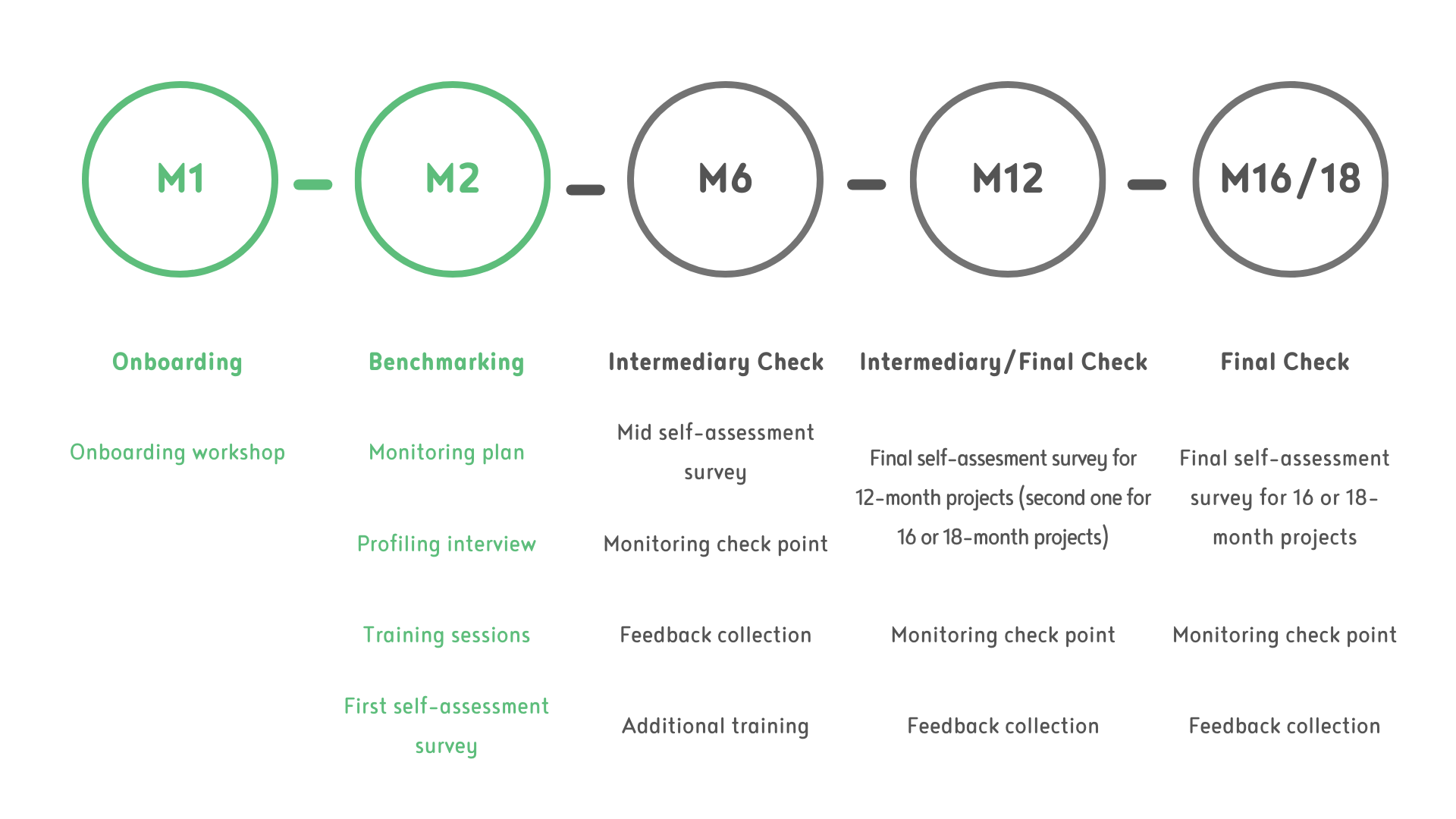
Support Plan
Pilots Support & Assessment
Once the applications are selected as winning pilots, the Pilot Support team will take over the support role.
During the pilot implementation period, pilot consortia are provided with various levels of support to ensure proper delivery of solutions, both in terms of budget and timely execution. Participation in the Pilot Support programme is expected and pilot consortia should include their effort in the budget.
The support activities encompass the onboarding process, mentoring, and training program across the pilot implementation period.
For example for 12-month pilots, there's a kick-off meeting in the first month (M1), a mid-term evaluation, and a final evaluation at the pilot's end. The timing of the intermediary and final check is related to the pilot's total duration.
Expected Schedule of the Pilot Support
Onboarding
During the onboarding, detailed guidelines will be provided to the participants. It starts with an onboarding workshop for all winners in each CfP round to introduce pilots to the onboarding process, training, monitoring and evaluation plans.
This is followed by individual meetings scheduled with each pilot to discuss specific plans, collect necessary information (benchmarking) and address their needs.
Mentoring
A mentor assigned to each pilot during the contract phase is the main contact point for the pilots, supported by a pool of experts and trainers.
The mentor facilitates smooth onboarding, acts as the primary entry point into the data space, and monitors progress through the blueprint deployment stages.
Mentors connect pilots to resources, while experts and trainers provide support on technical, business, governance and legal matters.
Find more information from the Call for Pilots Manual.
MONITORING AND ASSESSMENT
The monitoring and assessment of the pilots consist of benchmarking, mid-term and final evaluations, using pre-defined key performance indicators (KPIs).
They are categorised under Governance, Impact, Management, Support, and Technical indicators, each with minimum target values for evaluation criteria.
These target values represent the minimum goals for each pilot by the end of execution.
Find the list of KPIs in the Call for Pilots Manual.
An overview of the progress in KPI measurements should be provided as part of the interim and final reports of the awarded pilots.
The interim report must provide an overview of their progress along with their tasks, including datasets used, contribution to the Data Space, refinement of the blueprint, and local and general lessons.
The final report must provide a comprehensive summary of the activities undertaken, any deviations from the plan and their justifications.
Training Programme
In addition to evaluating progress regarding KPIs, the pilots are required to also participate in an overall impact assessment of the piloting activities, based on the DS4SSCC-DEP project’s Impact Framework.
The pilots will fill in a self-assessment survey at the start of their projects, where they will need to specify concrete indicators for impact measurement.
Furthermore, the proposed framework guides pilot consortia to break down their intended impact into measurable outputs, outcomes and longer-term impact objectives.
Read the full Pilots Onboarding and Support Plan here.
Get support: support@ds4sscc.eu
Each pilot team is required to designate participant(s) for active training (refer to Table 10 for a list of activities).
The training sessions aim to cater to the needs of both demand-side (local authorities) and supply-side (solution providers) participants.
Decision makers and IT experts from local authorities, along with business developers and IT experts from solution providers, will receive tailored training aligned with their respective roles, expertise, and knowledge levels.









